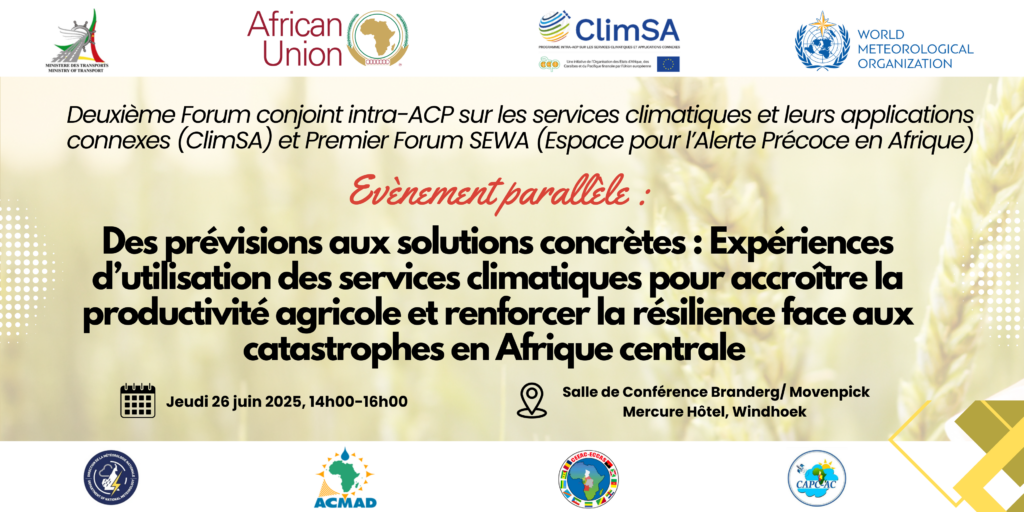Joint Second Intra-ACP Climate Services and Related Applications (ClimSA) Forum and the First Space for Early Warning in Africa (SEWA) Forum
DATE
26th June, 2025
14h00-16h00
VENUE
Salle de conférence Branderg/Movenpick
Mercure Hotel,Windhoek

BACKGROUND AND RATIONALE :
Climate Change poses a significant threat to socio-economic development around the world, particularly in Africa. The continent experiences compounded vulnerabilities, including water scarcity, food insecurity, degraded ecosystems, and an increased risk of disasters. Central Africa, particularly Cameroon, is especially vulnerable due to its limited capacity to adapt and economic constraints.
Science-based climate information and early warning systems are essential for reducing vulnerability and strengthening resilience. As recognized under the Paris Agreement, such services are central to advancing national development priorities, implementing NDCs, and meeting global and continental goals such as the SDGs and AU Agenda 2063.
Access to climate information and the provision of user-friendly climate services are essential for decision-makers at all levels. This support is crucial across various sectors, including agriculture and food security, disaster risk reduction, sustainable water and health management, and the development and implementation of climate change adaptation strategies. Although the use of climate information and predictions is rapidly increasing worldwide, many African countries, especially in Central Africa, still lack the necessary infrastructure, technical expertise, human resources, and institutional capacity to deliver high-quality climate services.
To meet this need, the ClimSA programme—an initiative funded under the 11th EDF and contributing to the Global Framework for Climate Services (GFCS)—is supporting the development of robust climate services in Africa. To strengthen the climate services value chain, ClimSA provides technical and financial assistance, infrastructure, as well as capacity building. Its overall objective is to promote sustainable development by combating climate change through strengthening the climate services value chain.
Cameroon, as a pilot country for the Central Africa sub-region, has made significant progress in implementing climate services along the value chain. These advances were made possible thanks to the support of the World Meteorological Organization (WMO), the African Centre for Meteorological Applications for Development (ACMAD), and the African Union Commission (AUC). In line with the ClimSA programme, priority was given to setting up and making operational the frameworks and user interfaces at the national level.
Several key activities are involved:
- Reviewing existing initiatives related to climate services and identifying the country’s needs to enhance these services.
- Organizing trainings on the climate services value chain.
- Evaluating the socio-economic benefits of climate services in crucial sectors such as agriculture and disaster management.
- Hosting national and local climate forums to advance the implementation of the national framework for climate services, particularly focusing on user engagement.
- Conducting regional workshops to share experiences and support user interfaces at the subregional level in Central Africa.
These initiatives are crucial for strengthening climate service delivery and greatly improving resilience throughout the region, ensuring a more robust and adaptable future for everyone.
The AUC, in collaboration with the Southern African Development Community (SADC) Secretariat and the Government of the Republic of Namibia, hosts the Joint Second Intra-ACP Climate Services and Related Applications (ClimSA) Forum and the First Space for Early Warning in Africa (SEWA) Forum from 23 to 27 June 2025 in Windhoek, Namibia. The main objective of the forum is the showcase of the major achievements of the ClimSA initiative, highlighting its impact on enhancing climate resilience across the region. This aligns with the broader goals of SEWA, which aims to strengthen early warning systems and improve disaster preparedness in Africa. Together, these forums will provide vital platforms for sharing best practices, fostering collaboration, and promoting innovative approaches to climate services and related applications.
ACMAD, in collaboration with the WMO, the AUC and the Department of National Meteorology of Cameroon, therefore organizes a side event the implementation of the climate services value chain in Cameroon and discuss the regional User Interaction Platform (UIP). This event will take place on June 26th, from 2:00 PM to 4:00 PM, and will provide an opportunity to showcase the socio-economic benefits (SEB) of climate services in the agriculture and disaster risk reduction (DRR) sectors in Cameroon.
OBJECTIVES :
This side event aims to share practical experiences and institutional knowledge on the integration and delivery of climate services in the agriculture and disaster risk reduction (DRR) sectors in Cameroon and beyond. Specifically, the session will:
- Highlight first-hand experiences and lessons from national stakeholders on applying the climate services value chain under ClimSA.
- Share examples of co-produced climate services and operational use by end-users (farmers, disaster managers, communities).
- Showcase the operationalization of Cameroon’s User Interface Platform (UIP), emphasizing user engagement and coordination mechanisms.
- Facilitate a peer exchange with other Central African countries on institutional enablers, challenges, and replicable innovations.
EXPECTED RESULTS :
By the end of the session, the following results are expected:
- Experience briefs on institutionalizing climate services in national DRR and agricultural frameworks
- Highlight of practical tools and services co-developed through the UIP process and Climate Outlook Forums (NCOFs)
- Documentation of challenges and success stories from implementing ClimSA activities in Cameroon
- Peer discussion on approaches for scaling, adapting, and sustaining experience-driven climate services
- A joint takeaway note on regional pathways for co-design, user uptake, and governance of climate services
Contact
For more inquiries, please contact this following link: contact@acmad.org
